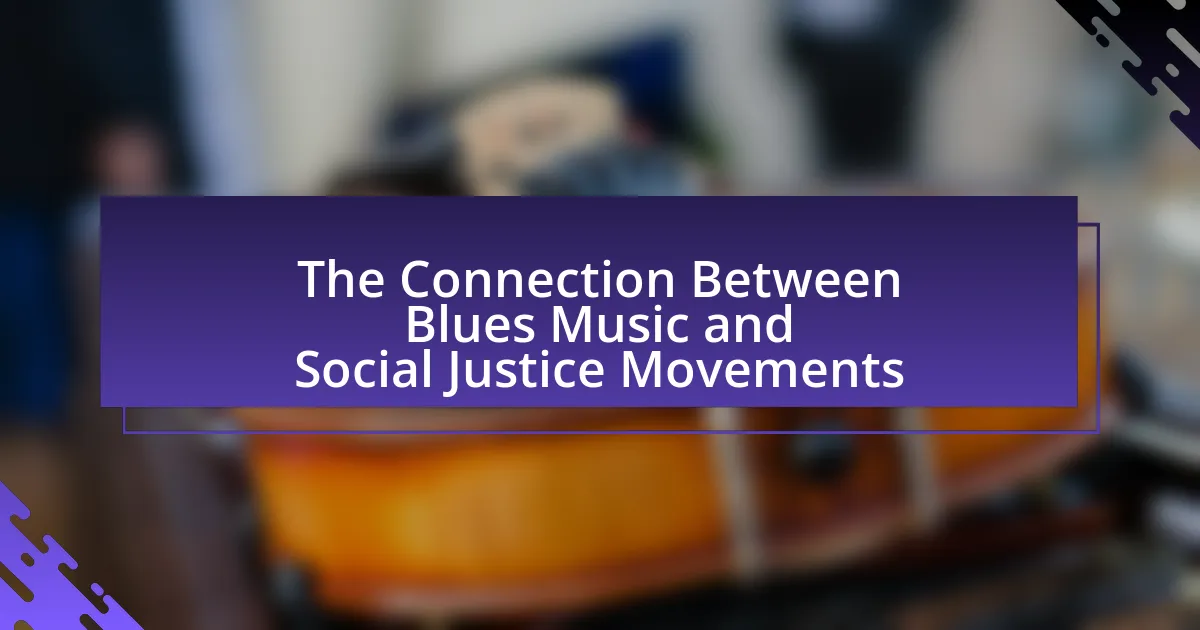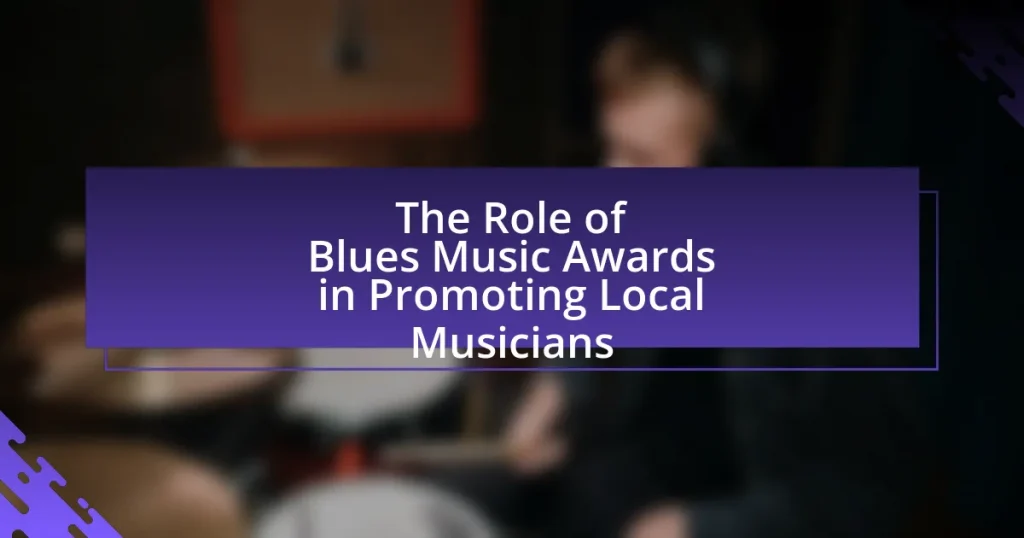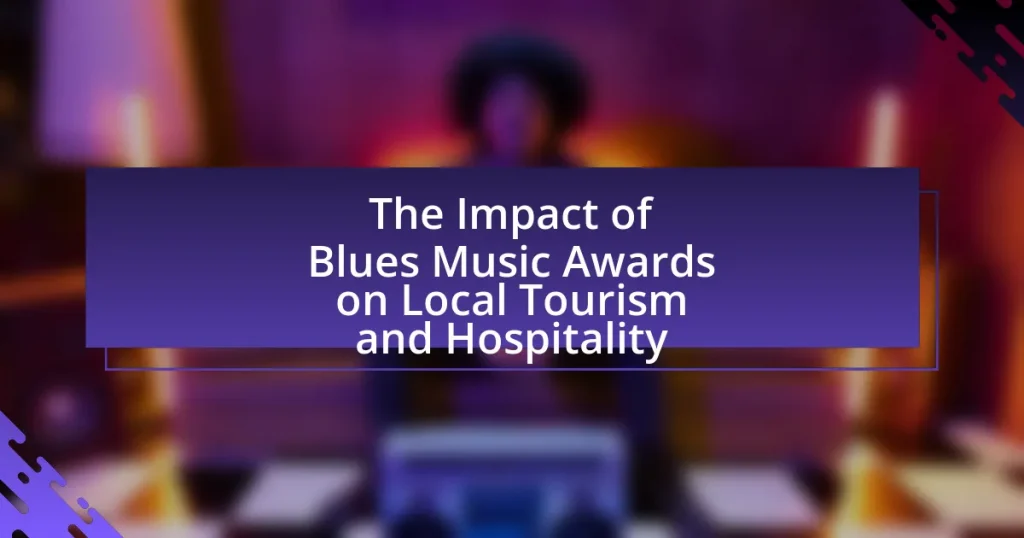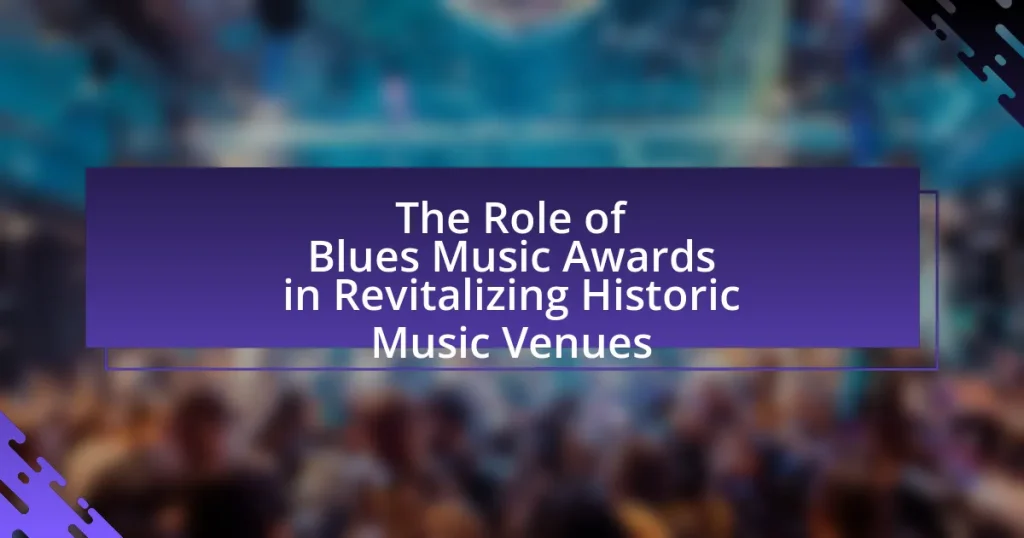Blues music is a genre deeply rooted in the African American experience, serving as a powerful voice for social justice movements. Originating in the late 19th and early 20th centuries, it reflects the struggles against oppression, racial discrimination, and economic hardship. The article explores the historical context of blues music, its connection to social justice, and how artists like B.B. King and Muddy Waters used their platforms to advocate for change. It also examines the themes of resilience and resistance found in blues lyrics, the impact of historical events on the genre, and its ongoing relevance in contemporary social justice movements.
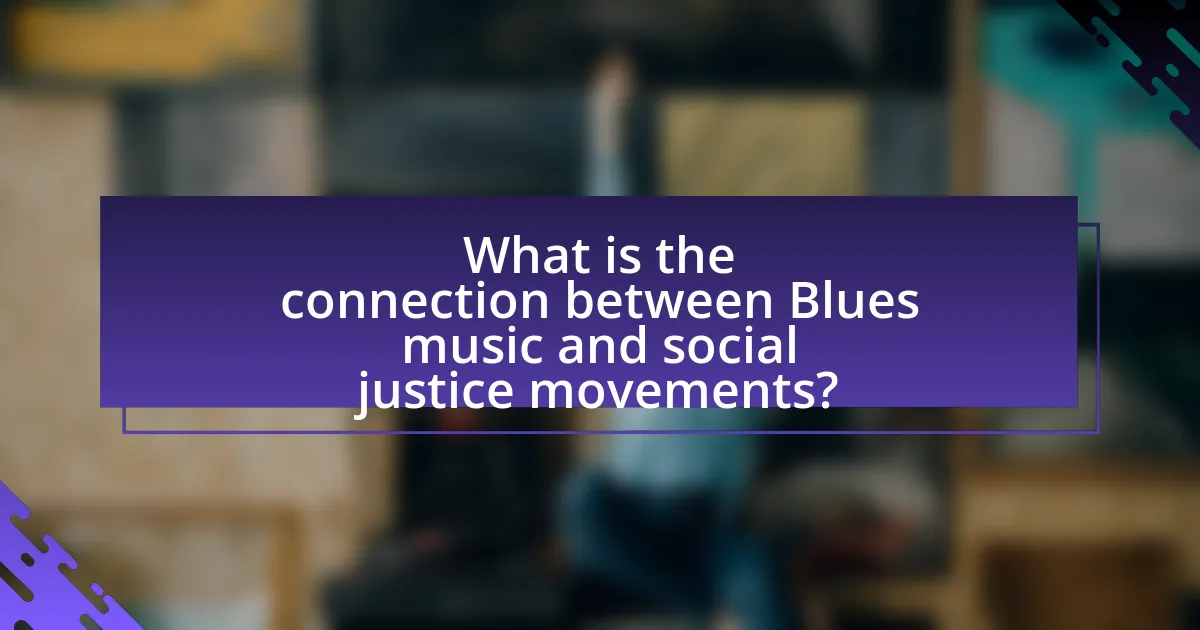
What is the connection between Blues music and social justice movements?
Blues music is intrinsically connected to social justice movements as it originated from the African American experience of oppression and resilience. The genre emerged in the late 19th and early 20th centuries, reflecting the struggles of marginalized communities, particularly in the context of racial discrimination and economic hardship. Songs often addressed themes of injustice, inequality, and the quest for freedom, serving as a form of protest and a means of expressing collective pain and hope. For instance, artists like B.B. King and Muddy Waters used their music to highlight social issues, while the Civil Rights Movement in the 1960s saw blues music become anthems for change, with songs like “We Shall Overcome” resonating deeply within the movement. This historical context illustrates how blues music not only provided a voice for the oppressed but also galvanized social justice efforts, making it a powerful tool for advocacy and change.
How did Blues music originate in the context of social struggles?
Blues music originated as a form of expression for African Americans facing social struggles, particularly in the post-Civil War South. This genre emerged from the combination of African musical traditions, spirituals, and work songs, reflecting the hardships of life under systemic racism, economic oppression, and social injustice. Historical evidence shows that the earliest blues recordings in the 1920s, such as those by Mamie Smith, highlighted themes of sorrow, resilience, and the quest for dignity, resonating with the experiences of marginalized communities. The music served not only as a means of coping but also as a vehicle for social commentary, influencing later civil rights movements and advocating for change.
What historical events influenced the development of Blues music?
The development of Blues music was significantly influenced by the Great Migration, which saw millions of African Americans move from the rural South to urban areas in the North between 1916 and 1970. This migration led to the blending of Southern musical traditions with urban influences, creating a distinct sound characterized by emotional expression and storytelling. Additionally, the impact of the Jim Crow laws and systemic racism in the South shaped the themes of struggle and resilience found in Blues lyrics. The economic hardships faced during the Great Depression further contributed to the genre’s evolution, as artists used music as a means of coping and social commentary. These historical events collectively laid the foundation for Blues music as a powerful form of expression linked to social justice movements.
How did the experiences of African Americans shape the themes in Blues music?
The experiences of African Americans profoundly shaped the themes in Blues music by reflecting their struggles, resilience, and cultural identity. The genre emerged from the historical context of slavery, segregation, and systemic racism, which influenced its lyrical content and emotional depth. For instance, themes of sorrow, hardship, and longing for freedom are prevalent in Blues songs, illustrating the pain of oppression and the quest for dignity. Notable artists like B.B. King and Muddy Waters often drew upon personal and collective experiences of discrimination and economic hardship, embedding these narratives into their music. This connection between lived experiences and musical expression not only provided a voice for African Americans but also served as a form of social commentary, highlighting injustices and fostering a sense of community and solidarity.
Why is Blues music considered a voice for the marginalized?
Blues music is considered a voice for the marginalized because it originated from the African American experience, expressing the struggles, pain, and resilience of those facing social and economic injustices. Historically, blues emerged in the Deep South during the late 19th and early 20th centuries, reflecting the hardships of life under systemic racism, poverty, and oppression. The lyrics often narrate personal and collective suffering, serving as a form of storytelling that resonates with marginalized communities. For example, artists like B.B. King and Muddy Waters used their music to highlight issues such as inequality and disenfranchisement, making blues a powerful medium for social commentary and a rallying cry for civil rights movements.
What messages of resistance and resilience are found in Blues lyrics?
Blues lyrics convey powerful messages of resistance and resilience, often reflecting the struggles and hardships faced by marginalized communities. These lyrics frequently address themes of oppression, injustice, and personal suffering, while simultaneously expressing hope and determination to overcome adversity. For instance, songs like “Strange Fruit” by Billie Holiday highlight the brutal realities of racism and lynching, serving as a poignant protest against racial violence. Additionally, artists such as B.B. King and Muddy Waters often incorporate narratives of personal struggle and perseverance, illustrating the strength required to endure life’s challenges. This blend of sorrow and strength in Blues music not only resonates with listeners but also serves as a form of social commentary, reinforcing the connection between the genre and social justice movements.
How do Blues musicians use their platform to advocate for social change?
Blues musicians advocate for social change by using their music and public platforms to address issues such as racial inequality, poverty, and civil rights. For instance, artists like B.B. King and Muddy Waters have historically infused their lyrics with themes of struggle and resilience, reflecting the socio-political climate of their times. Additionally, contemporary blues musicians often participate in benefit concerts and social justice campaigns, leveraging their visibility to raise awareness and funds for causes like police reform and community empowerment. This engagement is evident in events like the “Blues for Change” concert series, which directly supports marginalized communities and highlights systemic injustices.
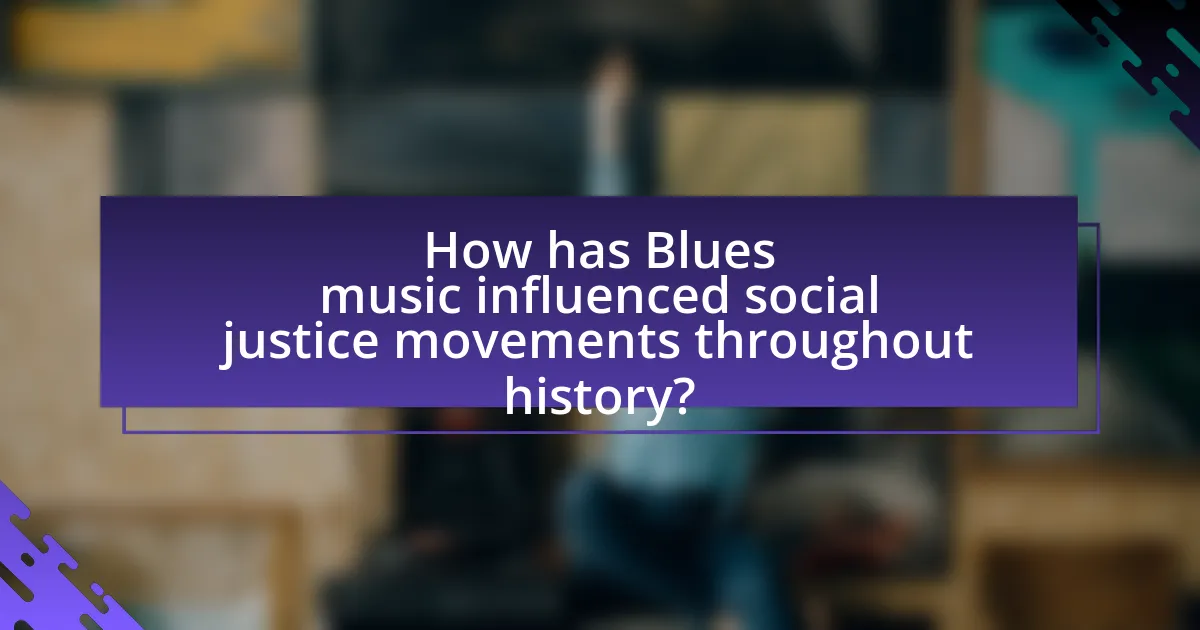
How has Blues music influenced social justice movements throughout history?
Blues music has significantly influenced social justice movements throughout history by serving as a powerful medium for expressing the struggles and aspirations of marginalized communities. Originating in the African American experience, blues music articulated themes of oppression, resilience, and hope, which resonated during pivotal social justice movements, such as the Civil Rights Movement. For instance, songs like “Strange Fruit,” performed by Billie Holiday, highlighted the horrors of lynching and racial violence, galvanizing public awareness and activism against systemic racism. Additionally, blues artists often participated in protests and rallies, using their music to inspire solidarity and mobilize support for civil rights initiatives. This historical context demonstrates that blues music not only reflected societal issues but also actively contributed to the discourse and actions surrounding social justice.
What role did Blues music play during the Civil Rights Movement?
Blues music played a significant role during the Civil Rights Movement by serving as a powerful form of expression and a tool for social change. Artists like B.B. King and Muddy Waters used their music to convey the struggles and injustices faced by African Americans, thereby raising awareness and fostering solidarity among listeners. The lyrics often addressed themes of oppression, resilience, and hope, resonating deeply with the movement’s goals. For instance, songs like “Strange Fruit,” originally performed by Billie Holiday, highlighted the brutal realities of racism and lynching, making it an anthem for civil rights activists. This connection between blues music and the movement not only provided emotional support but also mobilized communities to advocate for equality and justice.
Which prominent Blues artists contributed to the Civil Rights Movement?
Prominent Blues artists who contributed to the Civil Rights Movement include B.B. King, Muddy Waters, and Nina Simone. B.B. King used his music to address social issues and participated in various civil rights events, while Muddy Waters’ songs often reflected the struggles of African Americans. Nina Simone, although primarily known as a jazz artist, incorporated Blues elements in her work and was an outspoken advocate for civil rights, famously performing “Mississippi Goddam” in response to racial violence. Their contributions helped raise awareness and mobilize support for the movement.
How did Blues music serve as a rallying cry for activists?
Blues music served as a rallying cry for activists by articulating the struggles and injustices faced by marginalized communities, particularly African Americans. The genre’s lyrics often addressed themes of oppression, resilience, and hope, resonating deeply with those fighting for civil rights. For instance, songs like “Strange Fruit,” performed by Billie Holiday, highlighted the horrors of lynching and racial violence, galvanizing listeners to confront systemic racism. Additionally, during the Civil Rights Movement, blues musicians like B.B. King and Muddy Waters used their platforms to raise awareness and inspire action, reinforcing the connection between music and social justice. This historical context illustrates how blues music not only reflected societal issues but also motivated collective activism.
In what ways has Blues music been used in contemporary social justice movements?
Blues music has been utilized in contemporary social justice movements as a powerful tool for expression, protest, and community solidarity. Artists often incorporate themes of struggle, resilience, and social issues into their lyrics, reflecting the experiences of marginalized communities. For instance, musicians like Billie Holiday and more recently, artists such as Gary Clark Jr. and Shemekia Copeland, have addressed topics like racial injustice and police brutality in their songs, resonating with movements such as Black Lives Matter. The emotional depth and historical roots of Blues music allow it to serve as both a soundtrack and a rallying cry for social change, effectively mobilizing audiences and fostering a sense of unity among activists.
How do modern Blues artists address current social issues through their music?
Modern Blues artists address current social issues through their music by incorporating themes of racial inequality, economic hardship, and social justice into their lyrics and performances. For instance, artists like Gary Clark Jr. and Shemekia Copeland tackle issues such as police brutality and systemic racism, reflecting the ongoing struggles faced by marginalized communities. Their songs often draw from historical contexts, linking contemporary challenges to the legacy of the Blues as a voice for the oppressed. This connection is evident in Clark’s “This Land,” which directly confronts racism and identity in America, while Copeland’s “America’s Child” addresses the impact of social injustice on youth. By using their platforms to raise awareness and inspire change, these artists continue the tradition of Blues music as a powerful tool for social commentary and activism.
What impact does Blues music have on community organizing today?
Blues music significantly impacts community organizing today by serving as a powerful tool for social justice advocacy and collective action. The genre’s historical roots in African American struggles resonate with contemporary movements, fostering solidarity and cultural identity among marginalized groups. For instance, events like the Blues and Social Justice Festival highlight how music can mobilize communities, raise awareness about social issues, and inspire activism. Additionally, studies show that music, including Blues, enhances community cohesion and encourages participation in civic engagement, as seen in initiatives that use Blues to address issues like racial inequality and economic justice.
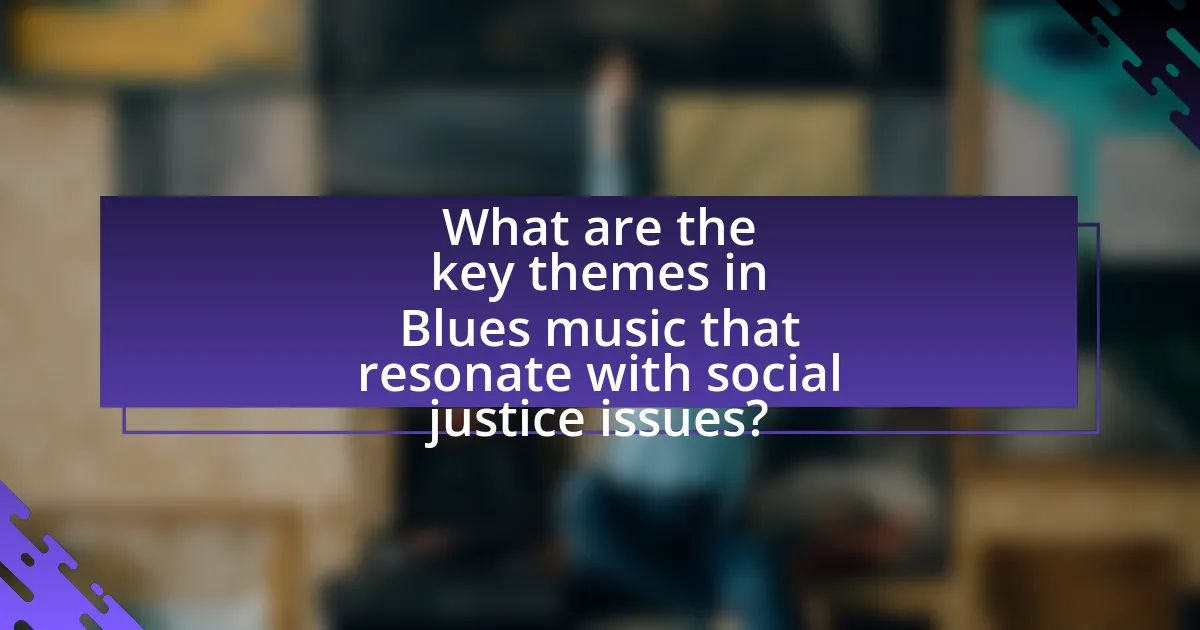
What are the key themes in Blues music that resonate with social justice issues?
Key themes in Blues music that resonate with social justice issues include oppression, resilience, and the struggle for equality. Blues artists often express the pain of systemic racism and economic hardship, reflecting the lived experiences of marginalized communities. For instance, songs like “Strange Fruit” by Billie Holiday poignantly address the horrors of lynching, serving as a powerful protest against racial violence. Additionally, the theme of resilience is evident in the narratives of overcoming adversity, which can inspire movements for social change. The historical context of Blues music, emerging from African American experiences in the South, underscores its role as a voice for social justice, making it a significant cultural artifact in the fight for civil rights.
How do themes of oppression and struggle manifest in Blues music?
Themes of oppression and struggle manifest in Blues music through lyrical content that reflects the hardships faced by African Americans, particularly during the Jim Crow era. The genre often addresses issues such as racial discrimination, economic hardship, and personal suffering, using storytelling to convey the emotional weight of these experiences. For example, songs like “Strange Fruit,” performed by Billie Holiday, explicitly highlight the brutal realities of lynching and racism in America. This direct engagement with social injustices not only serves as a form of artistic expression but also as a means of raising awareness and fostering solidarity within marginalized communities. The historical context of Blues music, emerging from the African American experience in the South, reinforces its role as a powerful vehicle for articulating struggles against oppression.
What specific social injustices are commonly addressed in Blues songs?
Blues songs commonly address social injustices such as racial discrimination, economic inequality, and police brutality. These themes reflect the historical context of African American experiences, particularly during the Jim Crow era, when systemic racism was prevalent. For instance, songs like “Strange Fruit” by Billie Holiday explicitly confront the horrors of lynching, highlighting the brutal reality faced by Black individuals in America. Additionally, the lyrics often depict struggles with poverty and the lack of opportunities, illustrating the economic hardships that marginalized communities endure. The genre serves as a powerful medium for expressing the pain and resilience associated with these injustices, making it a significant part of social justice movements.
How do personal narratives in Blues reflect broader societal issues?
Personal narratives in Blues music reflect broader societal issues by articulating the struggles and injustices faced by marginalized communities, particularly African Americans. These narratives often address themes such as poverty, racism, and oppression, providing a voice to experiences that are frequently overlooked in mainstream discourse. For instance, songs like “Strange Fruit” by Billie Holiday explicitly confront the horrors of lynching and racial violence, serving as a poignant commentary on systemic racism in America. This connection between personal suffering and societal critique illustrates how Blues music not only expresses individual pain but also highlights collective social issues, making it a powerful tool for social justice movements.
What is the significance of storytelling in Blues music related to social justice?
Storytelling in Blues music is significant for social justice as it serves as a powerful medium for expressing the struggles and injustices faced by marginalized communities. Through personal narratives and vivid imagery, Blues artists articulate experiences of oppression, discrimination, and resilience, thereby raising awareness and fostering empathy among listeners. For instance, songs like “Strange Fruit” by Billie Holiday poignantly address the horrors of lynching, highlighting racial violence and injustice in America. This storytelling tradition not only preserves cultural history but also galvanizes social movements by inspiring collective action and solidarity against systemic inequalities.
How do Blues musicians use storytelling to connect with audiences on social issues?
Blues musicians use storytelling to connect with audiences on social issues by weaving personal and collective experiences into their lyrics, which often reflect struggles related to race, poverty, and injustice. For instance, songs like “Strange Fruit” by Billie Holiday poignantly address the horrors of lynching, serving as a powerful commentary on racial violence in America. This storytelling approach not only evokes emotional responses but also raises awareness about social injustices, making the audience more empathetic and engaged with the issues presented. The historical context of blues music, rooted in African American experiences, further amplifies its role as a vehicle for social commentary, allowing musicians to resonate deeply with listeners who share or understand these struggles.
What techniques do Blues artists employ to convey their messages effectively?
Blues artists employ techniques such as storytelling, emotional expression, and call-and-response patterns to convey their messages effectively. Storytelling allows artists to share personal and communal experiences, often reflecting struggles related to social justice, as seen in songs like “Strange Fruit” by Billie Holiday, which addresses racial violence. Emotional expression is crucial in blues music, where artists use vocal inflections and instrumental improvisation to evoke feelings of pain, resilience, and hope, resonating deeply with listeners. Additionally, call-and-response patterns engage the audience, creating a participatory experience that reinforces the communal aspect of the blues, making the messages more impactful and relatable.
How can individuals support the connection between Blues music and social justice?
Individuals can support the connection between Blues music and social justice by actively promoting and participating in events that highlight the genre’s historical ties to social issues. Engaging in community events, such as Blues festivals or concerts that feature artists addressing social justice themes, reinforces the cultural significance of Blues as a voice for marginalized communities. For instance, the Blues has roots in African American experiences of oppression and resilience, making it a powerful medium for advocacy. Supporting organizations that focus on civil rights and using Blues music as a platform for awareness can amplify messages of justice and equality. Additionally, purchasing music from artists who address social justice in their work directly contributes to the sustainability of these messages within the genre.
